Are you looking for ways to keep your teeth healthy and strong? Taking care of your oral hygiene is essential for a beautiful smile and overall well-being. In this article, we will explore five effective ways to ensure your teeth remain in tip-top shape. You’ll discover simple yet crucial steps you can take to maintain good oral health, from the importance of regular brushing and flossing to the benefits of a balanced diet and regular dental check-ups.
Firstly, let’s talk about the significance of brushing and flossing. Brushing your teeth twice a day with fluoride toothpaste helps remove plaque and bacteria, preventing cavities and gum disease. Don’t forget to replace your toothbrush every three to four months to ensure it remains effective. Additionally, daily flossing is vital for removing food particles and plaque from between your teeth, where your toothbrush can’t reach. By making these habits a part of your daily routine, you can significantly improve your oral health.
Next, the food you consume plays a crucial role in keeping your teeth healthy. A balanced diet that includes plenty of fruits, vegetables, and whole grains promotes good oral health. Avoiding sugary snacks and drinks is also vital, as sugar can contribute to tooth decay. Additionally, drinking plenty of water throughout the day helps wash away food particles and keeps your mouth hydrated. To learn more about these five ways to take care of your teeth, continue reading our informative article.
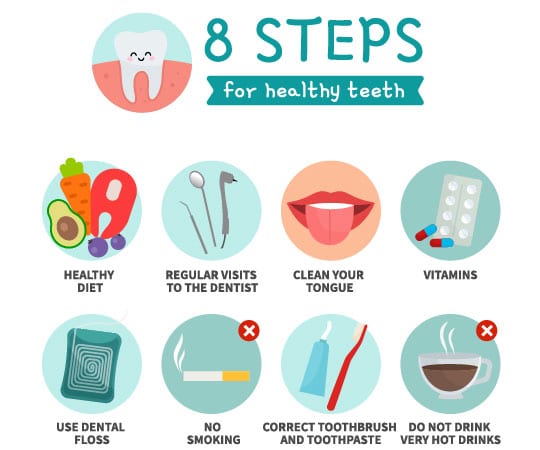
Importance of Dental Health
Why dental health is important for overall well-being
Maintaining good oral health is essential for maintaining overall well-being. Your dental health plays a significant role in your overall health, as poor oral hygiene can lead to various diseases and conditions. Research has shown a strong connection between gum disease and serious health issues such as cardiovascular disease, diabetes, and respiratory infections. By taking care of your teeth and gums, you can reduce the risk of developing these health problems and improve your overall well-being.
How dental health affects physical appearance
In addition to its impact on overall health, dental health also plays a vital role in your physical appearance. Your teeth are one of the first things people notice when they see you, and a healthy smile can boost your confidence and self-esteem. On the other hand, poor oral health can lead to dental issues such as tooth decay, gum disease, and bad breath, which can negatively affect your appearance. By practicing good oral hygiene and taking care of your teeth, you can achieve a beautiful smile and maintain your physical appearance.
Brushing Techniques
Choosing the right toothbrush and toothpaste
The first step in maintaining good oral hygiene is to choose the right toothbrush and toothpaste. When selecting a toothbrush, opt for one with soft bristles that can effectively clean your teeth without causing damage to your gums. Electric toothbrushes are also a great option, as they can provide a more thorough cleaning. When it comes to toothpaste, choose one that contains fluoride, as this mineral helps to strengthen your tooth enamel and prevent tooth decay.
Proper brushing techniques for effective cleaning
Brushing your teeth properly is essential for effective cleaning. Start by holding your toothbrush at a 45-degree angle against your gums and move the brush back and forth in short, gentle strokes. Be sure to brush the outer, inner, and chewing surfaces of your teeth, as well as your tongue to remove bacteria and freshen your breath. Brushing should be done for at least two minutes, twice a day.
Frequency and duration of brushing
To maintain optimum oral health, it is important to brush your teeth at least twice a day. Brushing in the morning removes bacteria that have accumulated overnight, while brushing before bed eliminates plaque and food particles that can lead to tooth decay and gum disease. Additionally, it is recommended to brush your teeth after consuming sugary or acidic foods or beverages to prevent damage to your tooth enamel. Remember to replace your toothbrush every three to four months or when the bristles become frayed.
Flossing and Interdental Cleaning
The significance of flossing in oral hygiene
While brushing cleans the surfaces of your teeth, it cannot reach the tight spaces between your teeth and under your gumline. This is where flossing and interdental cleaning come into play. Flossing removes plaque and food particles from these hard-to-reach areas, preventing the buildup of bacteria and reducing the risk of gum disease and tooth decay. It is an essential step in maintaining good oral hygiene.
Different types of dental floss and interdental cleaners
There are various types of dental floss available on the market, including waxed, unwaxed, flavored, and dental tape. Choose the type that suits your preferences and needs. In addition to traditional floss, you can also use interdental cleaners such as interdental brushes and water flossers. These tools can help you clean between your teeth effectively and are especially useful for those with braces or dental restorations.
Proper flossing technique for removing plaque and food particles
To floss your teeth effectively, start by taking a piece of floss measuring about 18 inches long. Wrap the floss around your middle fingers and hold it tightly between your thumbs and index fingers. Gently insert the floss between your teeth and move it back and forth in a sawing motion. Curve the floss around each tooth, ensuring you reach below the gumline. Repeat this process for each tooth, using a clean section of floss for each one.
Importance of Regular Dental Check-ups
Why regular dental check-ups are crucial
Regular dental check-ups are crucial for maintaining good oral health. While practicing good oral hygiene at home is important, professional dental care is necessary to ensure that any potential issues are detected and treated early. During a dental check-up, your dentist will examine your teeth and gums, check for signs of tooth decay, gum disease, and oral cancer, and perform a professional cleaning to remove plaque and tartar buildup. Early detection and treatment of oral health problems can prevent them from progressing into more serious conditions.
Routine dental examinations and professional cleanings
During routine dental examinations, your dentist will thoroughly examine your teeth, gums, and mouth for any signs of dental problems. They will check for cavities, gum disease, tooth misalignment, and other oral health issues. In addition to the examination, professional cleanings are performed to remove plaque and tartar buildup that cannot be removed through regular brushing and flossing. These cleanings help in preventing tooth decay and gum disease and promote optimal oral health.
Detection and prevention of oral health issues
Regular dental check-ups play a vital role in the early detection and prevention of oral health issues. By having routine examinations, your dentist can identify any signs of dental problems in their early stages, allowing for prompt treatment and prevention of further complications. For example, if a cavity is detected early, it can be filled before it progresses and requires more extensive treatment. Regular dental check-ups are essential for maintaining your oral health and preventing serious dental issues.
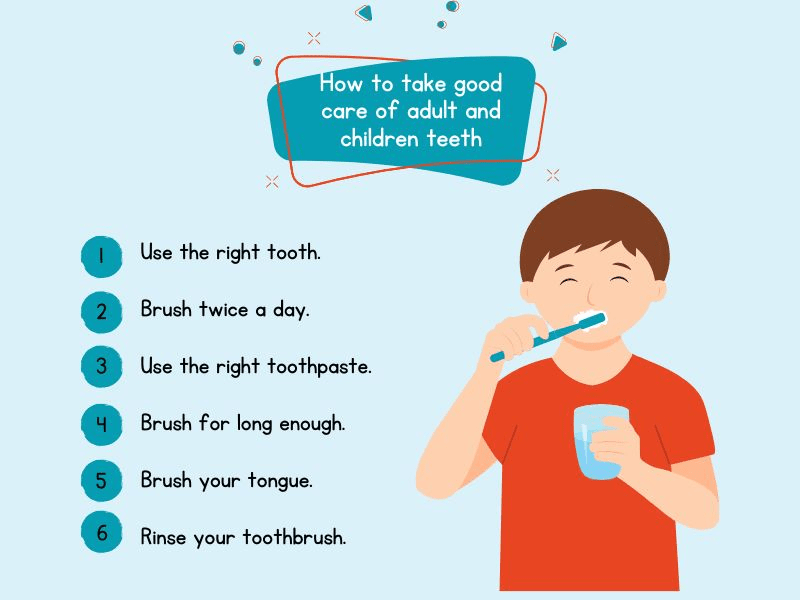
Maintaining a Healthy Diet
The impact of diet on dental health
Your diet plays a crucial role in maintaining good oral health. What you eat and drink can impact the health of your teeth and gums. A diet high in sugary foods and beverages can contribute to tooth decay and cavities, as the bacteria in your mouth feed on the sugars and produce harmful acids that erode your tooth enamel. On the other hand, a diet rich in vitamins, minerals, and fiber helps to strengthen your teeth and gums and promotes overall oral health.
Foods and beverages that promote healthy teeth
Incorporating certain foods and beverages into your diet can promote healthy teeth. Foods rich in calcium, such as dairy products, leafy greens, and almonds, help to strengthen your teeth and protect against tooth decay. Crunchy fruits and vegetables, such as apples and carrots, can help clean your teeth and stimulate saliva production, which neutralizes acids and helps to remineralize your teeth. Drinking plenty of water throughout the day is also beneficial for oral health, as it helps to wash away food particles and bacteria.
Foods to avoid for optimal oral health
While it is important to include tooth-friendly foods in your diet, it is equally important to avoid foods that can harm your teeth. Sugary and acidic foods and beverages, such as soda, candy, and fruit juices, should be consumed in moderation as they can contribute to tooth decay and erosion of the tooth enamel. Sticky and chewy foods can also get stuck in between your teeth, increasing the risk of cavities. It is best to limit your consumption of these foods and opt for healthier alternatives.
Limiting Sugar and Acidic Intake
Understanding the harmful effects of sugar and acid on teeth
Sugar and acidic foods and beverages can have detrimental effects on your teeth. When you consume sugary foods, the bacteria in your mouth feed on the sugars and produce acid as a byproduct. This acid attacks your tooth enamel, leading to tooth decay and cavities. Similarly, acidic foods and beverages directly erode the enamel, making your teeth more susceptible to decay. Limiting your intake of sugar and acidic foods is crucial for maintaining good oral health.
Tips for reducing sugar consumption and acid erosion
Reducing sugar consumption and acid erosion requires making conscious choices and adopting healthy habits. Start by reading food labels and avoiding products that contain high amounts of added sugars. Opt for fresh fruit instead of sugary snacks, and choose water or unsweetened beverages over sugary drinks. When consuming acidic foods or beverages, use a straw to minimize contact with your teeth, and rinse your mouth with water afterward to neutralize the acid. It is also essential to maintain good oral hygiene by brushing and flossing regularly to remove any residue and prevent tooth decay.
Alternatives to sugary and acidic snacks
Instead of reaching for sugary and acidic snacks, there are plenty of healthier alternatives that can satisfy your cravings and promote good oral health. Fresh fruits, such as strawberries and oranges, are naturally sweet and provide essential vitamins and fiber. Nuts and seeds are nutrient-dense snacks that can help strengthen your teeth. Cheese and yogurt are calcium-rich options that can protect your teeth and promote saliva production. By choosing these alternatives, you can enjoy snacking while keeping your teeth healthy.
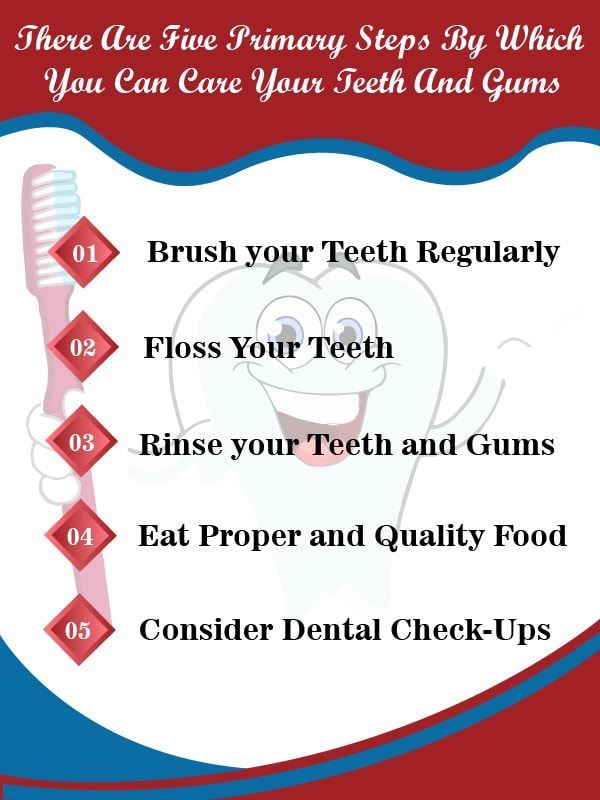
Incorporating Mouthwash and Fluoride
Benefits of using mouthwash and fluoride products
Using mouthwash and fluoride products can provide additional benefits to your oral care routine. Mouthwash helps to kill bacteria in your mouth, freshen your breath, and reduce plaque buildup. It reaches areas that your toothbrush and floss may not be able to access. Fluoride, on the other hand, is a mineral that strengthens your tooth enamel and helps to prevent tooth decay. Incorporating mouthwash and fluoride into your daily oral care routine can provide added protection for your teeth and gums.
Choosing the right mouthwash and fluoride treatments
When choosing a mouthwash, opt for one that contains fluoride and is alcohol-free, as alcohol can dry out your mouth. Look for a good antibacterial mouthwash that helps kill bacteria and freshens your breath. There are also specialized mouthwashes available for specific oral health issues, such as gum disease or sensitive teeth. When it comes to fluoride treatments, consult with your dentist to determine the best option for your needs, whether it be in the form of toothpaste, gel, or mouth rinse.
Incorporating them into daily oral care routine
To incorporate mouthwash and fluoride into your daily oral care routine, start by brushing your teeth with fluoride toothpaste. After brushing and flossing, rinse your mouth with an appropriate amount of mouthwash for the recommended duration. Swish the mouthwash around your mouth, making sure to reach all areas, including the back of your throat. Spit out the mouthwash and refrain from eating or drinking for at least 30 minutes to allow the fluoride to work its magic.
Proper Toothbrush and Tongue Cleaner Maintenance
Importance of keeping toothbrush and tongue cleaner clean
Proper maintenance of your toothbrush and tongue cleaner is essential for maintaining good oral hygiene. Your toothbrush and tongue cleaner can harbor bacteria, mold, and other microorganisms if not cleaned and stored properly. Using a dirty toothbrush or tongue cleaner can reintroduce harmful bacteria into your mouth, increasing the risk of oral health issues. By keeping them clean, you ensure effective cleaning and reduce the risk of bacterial growth.
Proper storage and replacement of oral care tools
To properly store your toothbrush, rinse it thoroughly after each use and shake off any excess water. Store it in an upright position, allowing it to air dry. Avoid storing your toothbrush in closed containers or covering it with a cap, as this can create a moist environment ideal for bacterial growth. Similarly, clean your tongue cleaner after each use and store it in a clean, dry place. It is also important to replace your toothbrush and tongue cleaner every three to four months or sooner if the bristles become frayed or worn out.
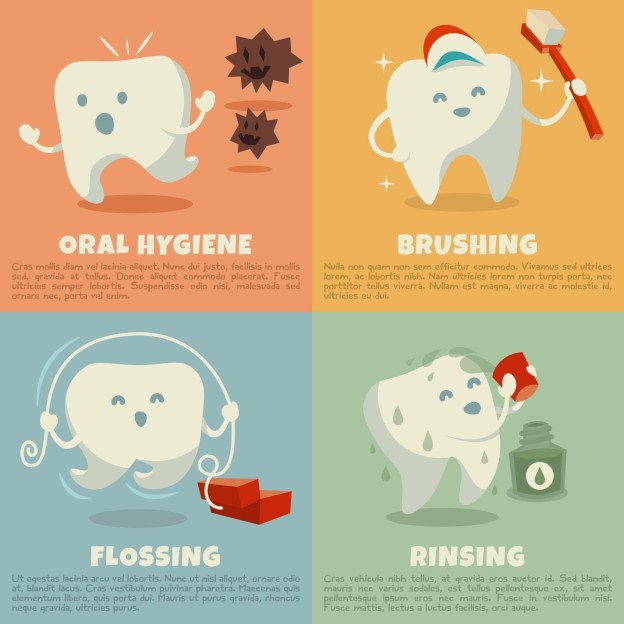
Preventing Teeth Grinding and Jaw Clenching
Understanding teeth grinding and jaw clenching
Teeth grinding, also known as bruxism, is a condition characterized by the excessive grinding or clenching of teeth. It can occur during sleep or when awake and is often associated with stress, anxiety, and misaligned teeth. Teeth grinding can lead to various dental problems, such as tooth wear, jaw pain, headaches, and even tooth fractures. It is important to address teeth grinding and jaw clenching to prevent further damage to your teeth and overall oral health.
Methods to prevent or manage bruxism
To prevent or manage bruxism, there are several strategies you can implement. Stress management techniques, such as exercise, meditation, and relaxation exercises, can help reduce the frequency and intensity of teeth grinding. Avoiding stimulating substances, such as caffeine and alcohol, particularly before bedtime, can also be beneficial. Additionally, wearing a custom-made mouthguard or splint at night can protect your teeth from grinding and alleviate the symptoms associated with bruxism. Consult with your dentist to determine the best approach for your specific needs.
Using mouthguards for protection
Mouthguards can be an effective tool for protecting your teeth from the harmful effects of teeth grinding and jaw clenching. There are three types of mouthguards available: stock mouthguards, boil-and-bite mouthguards, and custom-made mouthguards. Stock mouthguards are pre-formed and ready to use but may not fit properly. Boil-and-bite mouthguards can be customized by softening in boiling water and then biting down to create a mold. Custom-made mouthguards, made by your dentist, provide the best fit and protection. Using a mouthguard can help protect your teeth, jaw, and overall oral health.
Addressing Dental Anxiety and Fear
Common causes of dental anxiety and fear
Dental anxiety and fear are common feelings experienced by many people when visiting the dentist. There are several common causes of dental anxiety, including a fear of pain, prior negative dental experiences, fear of needles or drills, and discomfort with close proximity or loss of control. These feelings can prevent individuals from seeking necessary dental care, leading to deteriorating oral health.
Strategies to cope with dental phobia
There are several strategies you can use to cope with dental phobia and alleviate anxiety. Communicate your fears and concerns with your dentist, as they can tailor their approach to make you feel more comfortable. Practice relaxation techniques, such as deep breathing or listening to calming music, before and during your dental appointment. Distract yourself by engaging in activities such as reading a book or listening to a podcast while in the dental chair. Consider sedation dentistry options, such as nitrous oxide or oral sedatives, to help you relax during dental procedures. Seeking professional help from a therapist or psychologist specializing in dental anxiety can also provide long-term support.
Benefits of seeking professional help
Seeking professional help for dental anxiety and fear can have several benefits. A therapist or psychologist specializing in dental anxiety can help you identify the root causes of your fear and develop coping mechanisms to manage it. They can provide you with personalized strategies and techniques to alleviate anxiety during dental visits. By addressing dental anxiety, you can overcome your fear and take the necessary steps to maintain good oral health.
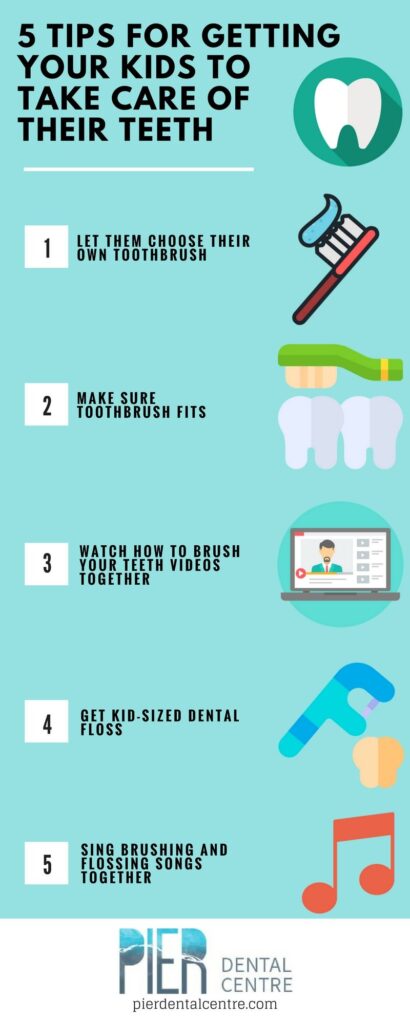
Incorporating Oral Health into Daily Routine
Creating a consistent oral care routine
Creating a consistent oral care routine is crucial for maintaining good oral health. This routine should include brushing your teeth at least twice a day, flossing or using interdental cleaners once a day, and rinsing with mouthwash if desired. By making oral care a priority in your daily routine, you develop good habits that become second nature over time.
Tips for maintaining good habits
To maintain good oral health habits, there are several tips you can follow. Set reminders or alarms on your phone to ensure you brush and floss at the recommended times. Keep your oral care products easily accessible in your bathroom so that you are more likely to use them consistently. Consider using a timer or an electric toothbrush with a built-in timer to ensure you brush for the recommended two minutes. Establishing a routine and sticking to it will help you maintain good oral health habits in the long run.
Encouraging oral health practices in children
Teaching children good oral health practices from an early age is essential for their overall oral health. Encourage them to brush their teeth at least twice a day, using a child-sized toothbrush and fluoride toothpaste. Supervise their brushing to ensure they are using proper technique and provide assistance if needed. Make brushing and flossing fun by incorporating games, songs, or rewards. Take your child to regular dental check-ups to instill the importance of oral care and to detect any potential issues early on. By teaching children good oral health practices, you set them up for a lifetime of healthy teeth and gums.
Common Dental Problems and Solutions
Prevalent dental issues and their causes
There are several common dental problems that individuals may encounter throughout their lives. Tooth decay, also known as cavities, is one of the most prevalent dental issues and is caused by a combination of bacteria, acid, and poor oral hygiene. Gum disease, which includes gingivitis and periodontitis, is another common problem that occurs due to plaque buildup and poor oral hygiene. Other dental issues include tooth sensitivity, tooth fractures, and tooth loss, which can be caused by trauma, tooth grinding, or advanced gum disease.
Effective solutions and treatments
Fortunately, there are effective solutions and treatments for common dental problems. Tooth decay can be treated with fillings, crowns, or root canal therapy, depending on the severity of the decay. Gum disease can be managed through professional cleanings, improved oral hygiene practices, and, in severe cases, surgical interventions such as gum grafts or pocket reduction surgery. Tooth sensitivity can be alleviated through the use of desensitizing toothpaste, fluoride treatments, or dental procedures such as bonding or dental sealants. In cases of tooth fractures or loss, solutions include dental bonding, dental implants, dental bridges, or dentures. Consulting with your dentist will allow you to determine the most appropriate solution for your specific dental problem.
Continuing preventive care to avoid future problems
While treating dental problems is important, it is equally important to continue preventive care to avoid future issues. This includes practicing good oral hygiene by brushing and flossing regularly, maintaining a healthy diet, and visiting your dentist for regular check-ups and cleanings. Additionally, addressing any underlying factors contributing to dental problems, such as teeth grinding or poor oral hygiene habits, can help prevent future issues. By committing to preventive care, you can maintain good oral health and reduce the likelihood of encountering common dental problems.
The Role of Dentists and Dental Professionals
The importance of dental professionals in oral care
Dental professionals play a critical role in maintaining good oral health. Dentists, dental hygienists, and dental assistants are trained professionals who are equipped with the knowledge and skills necessary to address a wide range of dental issues. They are responsible for conducting routine dental examinations, diagnosing oral health problems, and providing appropriate treatment and preventive care. Dental professionals not only treat dental problems but also educate patients on proper oral hygiene practices and the importance of maintaining good oral health.
Different types of dental specialists
Within the field of dentistry, there are various types of dental specialists who have undergone additional education and training in specific areas. Orthodontists specialize in correcting misaligned teeth and jaws, while periodontists focus on the treatment and management of gum disease. Endodontists specialize in root canal therapy, and oral surgeons are trained in performing surgical procedures involving the mouth, face, and jaws. Prosthodontists specialize in the restoration and replacement of teeth, and pediatric dentists specialize in the oral health care of children. Depending on your specific dental needs, your general dentist may refer you to a dental specialist for specialized treatment.
Consulting professionals for personalized advice
Consulting dental professionals for personalized advice and treatment is crucial for maintaining good oral health. They have the expertise to assess your unique oral health needs and recommend appropriate treatments and preventive measures. By seeking professional advice, you can address any existing dental issues and receive personalized guidance on how to maintain optimal oral health. Regular dental check-ups and consultations ensure that any potential problems are detected early, allowing for prompt treatment and prevention of future issues.
Conclusion
Taking care of your teeth is essential for your overall well-being and physical appearance. By following these five ways to take care of your teeth, you can maintain good oral health and achieve a beautiful smile. Brushing your teeth using proper techniques, incorporating flossing and interdental cleaning, scheduling regular dental check-ups, maintaining a healthy diet, and limiting sugar and acidic intake are key steps in ensuring good oral health. Additionally, incorporating mouthwash and fluoride, properly maintaining your oral care tools, addressing teeth grinding and jaw clenching, and managing dental anxiety and fear are equally important aspects of oral care. By making oral health a priority in your daily routine and seeking professional help when needed, you can achieve long-term oral health and a beautiful smile. Remember, prevention is always better than cure, so take care of your teeth today for a healthier tomorrow.